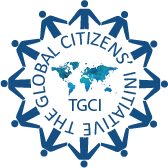Becoming a Global Citizen
At The Global Citizens’ Initiative (TGCI) we define a global citizen as someone who sees himself or herself as being part of an emerging world community and whose actions help define this community’s values and practices.
Historically, human beings have always organized communities based on shared identity. Such identity is forged in response to a variety of human needs and forces– economic, political, religious, and social. As group identities grow stronger, those who share them organize into communities, articulate their shared values, and build governance structures to support their beliefs.
Today the forces of modern information, communications, and transportation technologies are helping people develop global identity. In increasing ways these technologies are strengthening our ability to connect to the rest of the world; for example through the Internet; through strengthening our ability to participate in the global economic marketplace; through the ways in which we now see the world-wide impact of atmospheric change on our environment; and through the empathy we feel when we see pictures of humanitarian disasters in other countries.
Those of us who see ourselves as global citizens are not abandoning other identities, such as allegiances to our countries, ethnicities, and political beliefs. These traditional identities give meaning to our lives and will continue to help shape us. However, as a result of living in a hyper-connected and interdependent world, as global citizens we have an added layer of global responsibility. Our responsibilities include the following:
First, the responsibility to understand the ways in which the peoples and countries of the world are inter-connected and interdependent: For example, we need to understand the ways in which the global environment affects us where we live; the ways in which human rights violations in foreign countries can affect our own human rights; how growing income and resource inequalities within and between countries affect the quality of our own lives; how the global tide of immigration affects what goes on in our countries and how our own country’s immigration policies affect other nations.
Second, global citizens have the responsibility to understand global issues: Global issues are those that cannot be solved by individual nation-states. For example, we need to understand the impact of the growing scarcity of natural resources on all countries; the challenges presented by the current distribution of wealth and power in the world; the roots of conflict within and between countries and requirements of peace-building and peacemaking; and the challenges posed by a growing global population.
Third, global citizens have the responsibility to understand our own perspectives and the perspectives of others on global issues: Almost every global issue has multiple ethnic, social, political, and economic perspectives attached to it. It is the responsibility of global citizens to understand these different perspectives and work to build common ground solutions. A global citizen usually avoids taking sides with one particular point of view, and instead searches for ways to bring all sides together.
Fourth, global citizens have the responsibility to advocate for greater implement ion by our countries of international agreements, conventions, and treaties (ACTs) related to global issues: Global citizens have the responsibility to advocate for having our countries sign outstanding global agreements that they have not signed and for ratifying and complying with those that they have signed. ACTs are one of the building blocks of global collaboration among countries, collaboration that is essential for building a sustainable world community. Country global citizenship is just as important as the global citizenship of individuals. For more on this important topic of country global citizenship please visit TGCI’s Country Global Citizenship Project at http://www.countryreportcard.org
Fifth global citizens have the responsibility to promote and advocate for greater international cooperation between our countries and other nations: When a global issue arises, it is important for global citizens to speak out on how our countries can work with other nations to address this issue; and how our countries can work more effectively with established international organizations like the United Nations, rather than proceed on a unilateral course of action.
Finally, global citizens have the responsibility to adopt lifestyles and values that reflect our commitment to building a sustainable planet and demonstrate respect for the world’s cultural diversity. For example, we need to minimize our carbon footprint and protect the environmental resources in our local environment. We need to cultivate values of tolerance, compassion, and empathy for others, and build mutually supportive relationships with people from other cultures and countries.
